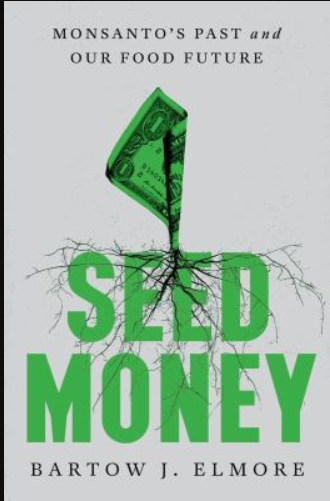Bartow J. Elmore. Seed Money: Monsanto’s Past and Our Food Future. Norton, 2021.

I was interested to read this book for three reasons.
- I was familiar with Elmore’s his excellent previous book, Citizen Coke, which I blogged about in 2014.
- I ran into Bart Elmore in, of all places, the restaurant of an otherwise empty hotel in Brasilia while I was on book tour for the Portuguese edition of Unsavory Truth, and he was doing the research for this book.
- I was particularly interested in what he had to say about the Monsanto events I described at length in the second half of Safe Food: The Politics of Food Safety. Not much, as it turns out.
This is a history of the company from its beginnings in the early 1900s as a producer of saccharine; to its production of 2, 4-D, PCBs, and other toxic chemicals; to its development and dependence on glyphosate; to its purchase by Bayer just as courts were deciding in favor of plaintiffs arguing that glyphosate was responsible for their cases of non-Hodgkin lymphoma.
From my reading, Elmore bends over backwards trying to be fair to the company but nevertheless paints a picture of a company that put profits over all other consideration, regardless of what its products were doing to human health. It’s not a pretty story.
Elmore is an historian who seems to be trying to remain dispassionate. He is disappointed that Monsanto lied when it claimed its products were safe and genetically modified foods would feed the world. His book, he says,
reveal[s] that GE [genetically engineered] technology was erroneously deployed over the past two decades and was more about selling chemicals than investing in real solutions to our food problems, which has resulted in wasted opportunities and wasted resources [p. 277].
I think what he documents about this company’s history of profit-driven lack of ethics is chilling. It deserves more than disappointment. It calls for outrage.



